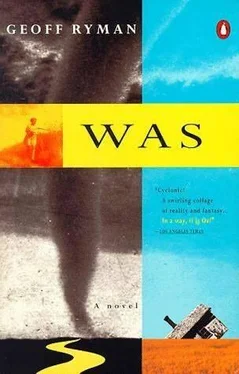"On," said Jonathan, "to Cedar Street."
"What's there?" Ira asked.
"A house," said Jonathan, with another secret smile.
"If this is some dumb movie-star pilgrimage…" Ira threatened. He had been the kind of kid who preferred Mozart to Kiss. And Bach to Mozart.
"You'll do what?" Jonathan asked.
"I'll tell everyone you're a John Wayne fan."
"Well, he's from Lancaster."
"I know! Listen, it's not John Wayne, is it? Please. Tell me it's not John Wayne."
"It's not John Wayne," said Jonathan, still smiling with his secret.
The house was on Cedar Street, on a corner, by what had once been the grammar school. "That's it, it must be it, two-story!"
"You want to stop?" Ira asked.
"No, no, keep going," said Jonathan, ducking down.
"Are you or are you not the world's only photo-realist actor?"
"I'm embarrassed," said Jonathan, and the words were like lead. "That's someone's house. I can't just go up and start snapping pictures. Go on, go on!"
There was a hum as the car accelerated. "I'll tell you one thing," said Ira, "you'll never be a photo-realist journalist."
"Drive round the block," said Jonathan. He switched baseball hats.
"Hey, master of disguise. Do you really think they won't recognize you in a different baseball hat?"
"You're a lawyer," accused Jonathan.
"Whenever I think straight, you tell me that."
Jonathan looked afraid. Ira chuckled and slapped his leg. "You're nuts," he said.
"I know," said Jonathan very seriously.
The fake-Spanish bungalows, the tiny 1920s frame houses with porches and tile roofs, slipped past. Consistency was not Jonathan's strong point. It ruined his career. He would sometimes freeze like this on a part. Something about it wouldn't be right, and Jonathan would have to stop. No amount of ambition, or gratitude to the people who had worked so hard to get him the part, could force a performance out of him. "I'm sorry," Jonathan would say, helpless. "I'm not being funny. I want to do it, I wish I could, but if I tried now there would be nothing. I'm sorry. I'm sorry." And implacable, he would walk away from money, from opportunity, from reputation.
And it isn't even artistic integrity, thought Ira. I mean, he does those terrible monster movies. There's just something in those that he can grab hold of.
"Go by there again, and just park," said Jonathan quietly.
And then sometimes, when it all came right, Jonathan would step into the lights of the stage of a little theater, and his friends would not know him, and there would be a hush or even a gasp from the small and scattered audience. It would be like a dagger coming out of a sheath. Jonathan could take people's breath away.
"Too close, back up," whispered Jonathan.
So they parked a few doors down, across the street, and Jonathan peered in silence across Ira's lap, through the window.
It was a two-story house, painted the dull green that desert dwellers felt made their homes more Arcadian. It was a strange shape. A long, low bungalow running north to south and, perched on top of it, very narrow like the deckhouse of a ship, a second floor that ran east to west. There was a low front porch, with funny pillars that each split into two thin green columns. There were extensions added onto the sides and frames for climbing plants. There were trees and lawns and shade.
Jonathan was all angles, knees, elbows and wide hunched shoulders. He went more and more still. Ira looked at him.
"You're beginning to look like the house," Ira said. Talent was spooky.
"We better go," whispered Jonathan.
"Get out. Take a walk around it. Take pictures, ask if you have to. You'll regret it if you don't."
"Take it for me?" Jonathan asked, holding out the camera. Ira sighed, suddenly unwilling. Ira did everything else.
"You're right," said Jonathan, and took back the camera. He shrugged and stretched his way out of the house shape and twisted around to get out of the car. He stepped into sunlight.
The curtain seemed to go up. As he got out, Jonathan began to blaze with excitement. "It's all just like it was Back Then. Look, there's a child's tricycle on the porch!" This seemed to be very meaningful to him.
Surreptitiously, grinning like an elf, he started to snap and snap and snap.
"Is it in focus?" Ira asked.
"Yeah. I reckon that extension there is the kitchen, but it looks more recent, maybe thirties, so my guess is the kitchen was out back, probably on the right not the left, and the central staircase would go up just a bit behind the front door there, and maybe two bedrooms upstairs, or possibly the bathroom, 'cause they might have pumped the water up to roof tanks, to heat it, to store it. Come on."
He skittered nervously around the back, into the alley. "See, they still reckoned on some people having a horse and buggy even in the twenties. That's what this is for, bring the horses around to the back. Like mews in London."
There were bicycles and baskets and large colored plastic objects. "Toys," whispered Jonathan. There were large old leafless trees and a crisscrossing of heavy wiring in midair. The rear extension had windows that seemed too large. "That was a door," said Jonathan. The camera kept making a noise like it was chewing gum. Jonathan was not even looking through the viewfinder.
"Okay, okay," said Jonathan, breathless. "Come on."
They went down Oldfield and turned left onto the Sierra Highway again. "Go slow," begged Jonathan, but he was disappointed. There was hardly anything left from Back Then. Everything was huge and flat and spread out, a car lot, a Swedish smorgasbord, an empty stretch of bare brown earth alongside the train tracks. MICHAELS COACHWORKS, boasted a sign, since 1974. "Slow," said Jonathan. They passed a brick building with mildly Art Deco decoration along the roof.
"What are we looking for?" Ira asked.
"An old movie theater. It was made out of brick. It burned down." They both looked, but saw nothing like it. They came to Lancaster Boulevard-Tenth Street as it had once been. "Might as well turn," sighed Jonathan. As they did, a movie house with huge, decrepit, late fifties, early sixties lettering slipped past. "No, that's not it, and it wouldn't be here anyway," said Jonathan. He looked disgruntled.
Lancaster Boulevard looked left behind by the postmodern world. The flat-roofed, flat-fronted storefronts tasted of the early sixties. There were cars parked, but no people walking, and a hush. The shadows were long. Ira was about to say, as if it were his fault, that he was sorry.
And then Jonathan sat up. "Oh wow!" he said, like the old hippie he secretly was. "Pull over."
They did. There was plenty of parking space. "Will you look at that!" said Jonathan.
An old wooden building, scarred in a line where a porch had been torn away from its frontage, stood perched absurdly on stilts. It looked like a woman afraid of a mouse, holding up her skirts.
"I reckon I know what that is," said Jonathan, his grin fierce. He grabbed the Lancaster book and flipped through the pages and turned a page of photographs around. "Yup," he said. "Look, see these photographs? They were taken in '36 from the water tower, so you see about half the town. Now the water tower was on Cedar. And look!"
Jonathan pointed. Ira waited for an explanation.
Jonathan read from the caption, " 'Far left is the Western Hotel.' See the two palm trees?"
By the sidewalk, on the other side of the chain-link fence from the old building, there were two tall palm trees. In the photograph, taken from high up, the palm trees were smaller, below roof height. They shaded the doorway.
"What they've done is hoist the whole building up and move it back," said Jonathan, and grinned. "They're saving it!" He was pleased.
Читать дальше












